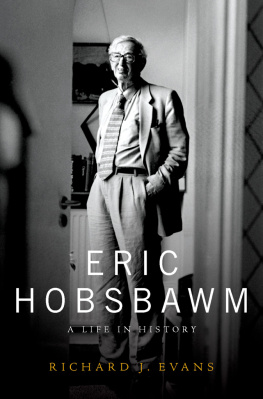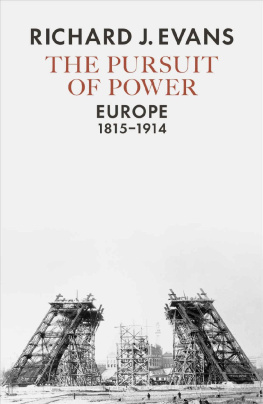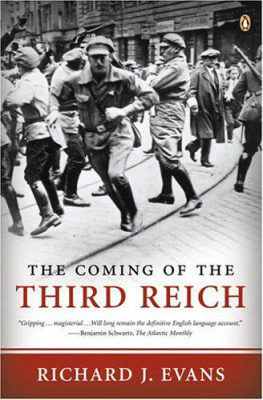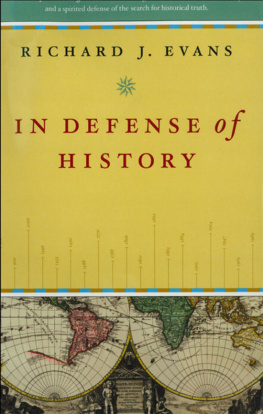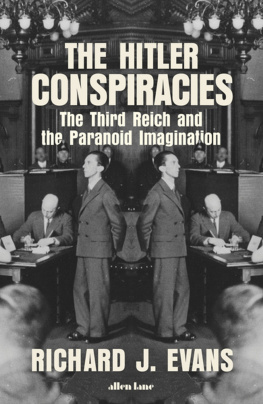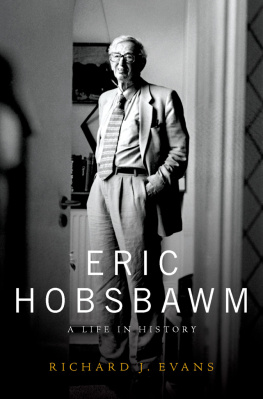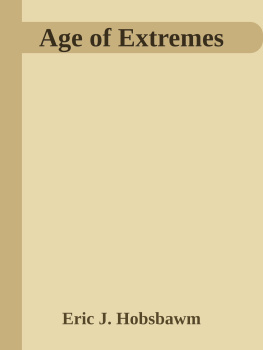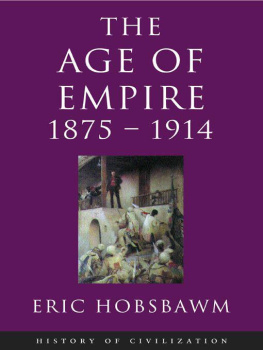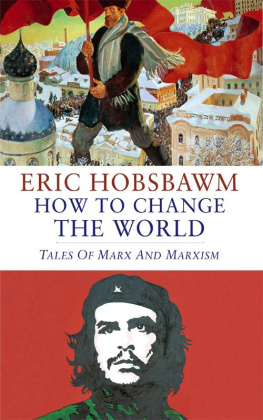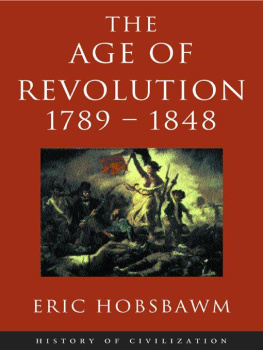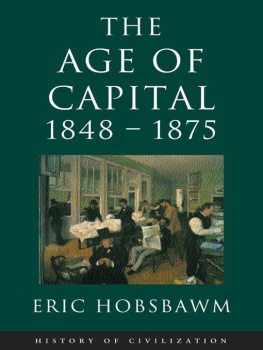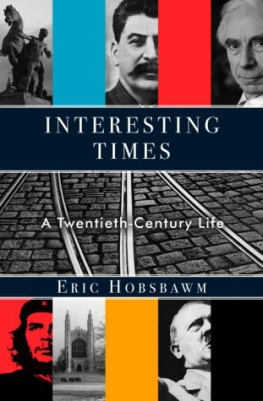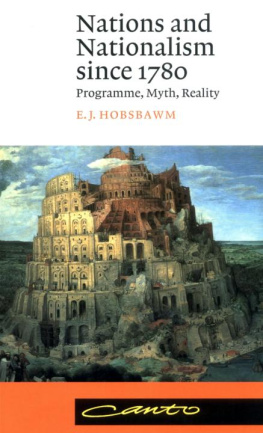Eric Hobsbawm
Eric Hobsbawm
A Life in History
RICHARD J. EVANS


Oxford University Press is a department of the University of Oxford. It furthers the Universitys objective of excellence in research, scholarship, and education by publishing worldwide. Oxford is a registered trade mark of Oxford University Press in the UK and certain other countries.
Published in the United States of America by Oxford University Press 198 Madison Avenue, New York, NY 10016, United States of America.
Richard J. Evans 2019
First published in Great Britain by Little, Brown
All rights reserved. No part of this publication may be reproduced, stored in a retrieval system, or transmitted, in any form or by any means, without the prior permission in writing of Oxford University Press, or as expressly permitted by law, by license, or under terms agreed with the appropriate reproduction rights organization. Inquiries concerning reproduction outside the scope of the above should be sent to the Rights Department, Oxford University Press, at the address above.
You must not circulate this work in any other form and you must impose this same condition on any acquirer
Library of Congress Cataloging-in-Publication Data
Names: Evans, Richard J.
Title: Eric Hobsbawm : a life in history / Richard J. Evans.
Description: New York : Oxford University Press, [2019]
Identifiers: LCCN 2018051780 | ISBN 9780190459666 (EPUB)
Subjects: LCSH: Hobsbawm, E. J. (Eric J.), 19172012. |
HistoriansGreat BritainBiography. |
Communist college teachersGreat BritainBiography. |
Communism and intellectualsGreat BritainHistory20th century. |
Jews, GermanGreat BritainBiography. |
BISAC: BIOGRAPHY & AUTOBIOGRAPHY / General. |
BIOGRAPHY & AUTOBIOGRAPHY / Historical. |
HISTORY / Europe / Western.Classification: LCC D15.H63 E38 2019 |
DDC 907.2/02dc23 LC record available at https://lccn.loc.gov/2018051780
Contents
At the time of his death in 2012, at the age of ninety-five, Eric Hobsbawm had for some years been the best-known and most widely read historian in the world. His passing merited front-page headlines not only in the United Kingdom but also in countries as far apart as India and Brazil. His books were translated into more than fifty languages. Almost all of them have been continuously in print ever since their first publication, which in some cases dates back to more than half a century ago. Millions of readers have found their combination of analytical rigour, stylistic brilliance, interpretative brio and entertaining detail impossible to resist. In Brazil alone, sales of his books totalled almost a million, and his Age of Extremes topped the bestseller lists for weeks. His work was not only very widely read, but also exercised an enormous and lasting influence on historical thinking, as he came up with a whole series of novel concepts ranging from the general crisis of the seventeenth century and the invention of tradition to social banditry and the long nineteenth century. Debates on his work, from the standard of living in the Industrial Revolution to the origins of nationalism, continue to inspire new historical research many decades after he set them in motion.
Eric Hobsbawms huge reputation and global influence as an historian would alone be sufficient justification for devoting a biography to him, but he was also a public intellectual and influential spokesman for the Left, and not just in Britain. In the 1980s and early 1990s he played a key role in the political debates behind the rise of New Labour, a role that towards the end of his life he came to regret. Lula da Silva, who became President of Brazil in 2003, explicitly acknowledged Erics impact on his thinking, as did his predecessor Fernando Henrique Cardoso. Erics influence on the Left was equally notable in India and Italy. Not for him the quiet life of a scholar shuffling between the study, the library and the lecture hall. For many years, his political activities were regarded as dangerous enough to attract surveillance by MI5.
This book is subtitled A Life in History because Eric was not only an historian by profession but was also present at major moments in the history of the twentieth century, beginning with the Nazi seizure of power in Berlin in 1933, and continuing through the first celebrations of Bastille Day after the election of the Popular Front in France in 1936, the Spanish Civil War in the same year, the outbreak of the Second World War in 1939, the war itself and on to the Cold War and beyond. His unpublished diaries and letters and the many other sources available to tell the story of his life give a vivid impression of Berlin, London, Cambridge and Paris in the 1930s, the British Army in the early 1940s, the McCarthyite atmosphere of the late 1940s and early 1950s, the crisis of Communism in 1956, the jazz scene in Soho in the late 1950s, the upheavals that convulsed Latin American politics and society in the 1960s and 1970s, the rise of Eurocommunism in Italy around the same time, the political debates within the Labour Party in the 1980s, and the intellectual politics of Frances cultural elite in the 1990s.
This is a very long book not least because Eric Hobsbawm lived for a very long time. He remained active, intellectually undiminished and politically committed, into the second half of his tenth decade, writing and publishing all the time. But the book is also long because I have tried to let Eric tell his story as far as possible in his own words. He was a compelling and engaging writer, not just in his chosen field of history, but in many other genres as well. His immense output included short stories, poems, descriptions of the natural world, travelogues, political tracts, personal confessions, and much more besides. He knew how to tell a good story, not only about the past but also about his own life. Although his historical works sold millions of copies in scores of languages across the world, much of his other writing remains little known. A good deal of the material presented in this book has never been published before; much of it is brilliant and deserves to be widely read.
Any biographer who attempts a life of Eric Hobsbawm has to confront his own autobiography, Interesting Times, published in 2002. The book was, he said, more about the story of the public than the private man. This book will show how his intuition as an historian was shaped not just by the political and historical context in which he lived but also by his personal circumstances, commitments and passions. I have tried to avoid overlap between this book and Interesting Times as much as I can, but inevitably, it has not always been possible, especially for the early part of his life. Still, Erics autobiography is above all a work of memory, while this biography is based overwhelmingly on sources contemporary with the thoughts and actions they describe. It does not in any way seek to replace Interesting Times, which can be read with profit and enjoyment alongside it.
I knew Eric not intimately, but for a fairly long time; to tell the truth, I was too much in awe of him to become a close friend, for I knew that on almost any subject on which we might converse, he would know infinitely more than I did. Not that I agreed with him on everything, far from it; I have always been a social democrat in my political convictions. I could never accept the fundamental premises of Communism, least of all after seeing at close quarters what they produced in the grim, grey and joyless dictatorship of Communist East Germany when I got to know it during the researches I carried out for my doctorate in the early 1970s. But the task the historian has to fulfil above all others is to enter into an understanding of the strange and often alien world of the past, not to condemn it on the one hand or identify with it on the other. What I have tried to do in this book is to present Eric Hobsbawm to twenty-first-century readers and let them make up their own minds about what he said, did, thought and wrote.

